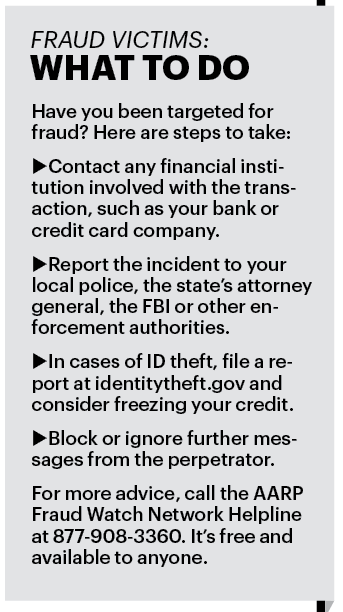AARP Hearing Center

On a Saturday afternoon in September 2023, a red pop-up flashed on Karin Schmeling’s screen, accompanied by a jolting siren. A message said her computer had been hacked. It gave her a number to contact at Microsoft.
When she called, Schmeling was told someone had gotten into her bank account and was about to send three money orders to “child porn sites in China.” To stop that from happening, she had to quickly deposit money in a “federal safety locker.”
But it wasn’t Microsoft on the other end of the line, and the “federal safety locker” was a Bitcoin teller machine in a liquor store about 3 miles from her home, in Greenfield. Immediately after Schmeling had inserted $4,400 in $100 bills, she knew it was a scam.
Schmeling, 70, is a retired clinical nurse specialist. But she acknowledges she’s no computer expert. “The whole time I was driven by panic and fear and urgency and adrenaline,” she says. “There was no time to think.”
Recent guidance from the state’s Department of Financial Institutions on the state’s new money transmission law aims to protect consumers like Schmeling by tightening oversight of Bitcoin teller machines, also known as BTMs, cryptocurrency ATMs or virtual currency kiosks.
Under the guidance, operators of BTMs must limit transactions to $2,000 per day per user. Beyond that, the requirements direct kiosk operators to maintain anti-fraud policies and to post warnings about potential scams on each machine — as well as electronically on the screen when a transaction starts.
Those who fail to comply could lose their licenses.
“We’re used to seeing some really harrowing stories about losses that people incur,” says Michael Gavigan, assistant chief legal counsel for the Department of Financial Institutions. “If we can prevent one of those, that’s a job well done. Obviously, we’re hoping the impact will be broader than that.”
Courtney Anclam, senior program specialist for AARP Wisconsin, calls the new requirements “fantastic.” The transaction limit, she adds, provides time for people “to reassess the situation” if they are about to feed money into a BTM. And she says the anti-fraud policies “make the operators plan for how they’re going to protect consumers.”
CRYPTO FRAUD ON THE RISE
Cryptocurrency is a virtual form of currency loosely regulated by governments. According to AARP, and to FBI data, older adults are disproportionately affected by fraud and scams using cryptocurrency ATMs — and both the number of complaints and total losses are going up rapidly.

The scams usually direct victims to deposit money in BTMs, which are found in convenience stores, gas stations and other locations. Some resemble traditional bank ATMs; others have a sleeker, more modern look, with larger touchscreens, Anclam says.
People targeted by scammers might be promised a lucrative investment opportunity or told to deposit money to avoid fake “penalties.” Or they may have developed an online relationship with a scammer who says he’s stuck overseas and needs money.
Like Schmeling, Gavigan says most never get their money back — including many with losses much steeper than hers.
“I’ve seen nominal amounts up to tens of thousands of dollars,” says Angel Rose Kwaterski, an attorney and consumer coordinator for Legal Action of Wisconsin, a nonprofit law firm that provides free legal help to those in need.
More than 15 states now have laws to limit crypto scams. Iowa’s is among the strongest, says Francoise Cleveland, an AARP government affairs director specializing in fraud. That state has a $1,000 daily transaction limit and enables refunds to users who report fraudulent transactions within 90 days.
Wisconsin could eventually expand its protections. “This isn’t intended to be the final word in this area,” says Gavigan. ■
Philip Walzer is a retired newspaper reporter and alumnus magazine editor in Norfolk, Virginia.
Join AARP Wisconsin at two Scam Jams this year:
- Madison Tuesday, Sept. 30, 1-4 p.m., Goodman Community Center, 214 Waubesa St. -REGISTER HERE.
- Green Bay Thursday, Oct. 16, 1-4 p.m., University of Wisconsin-Green Bay, University Union Phoenix Rooms, 2430 Campus Court - REGISTER HERE.
More on Crypto
What You Need to Know About Bitcoin and Cryptocurrency
How Crypto Investment Scams Work
What to Know About Cryptocurrency Scams































































